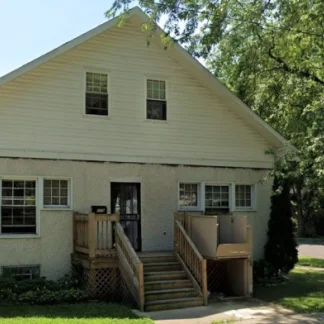Christian Community Health Center - CCHC
Christian Community Health Center (CCHC) provides faith-based addiction recovery...
Prentice Place, in Chicago, Illinois, is a halfway house for adult men in recovery who are exiting a correctional facility. Specialized programs for young adult males and men with co-occurring addiction and mental health disorders are available. Primary treatment modalities include 12 step focused individual, group, and family counseling and recovery focused life skills training.
Prentice Place is a sober living facility for adult men recovering from drug and alcohol addiction who are exiting incarceration. They offer transitional housing, dual diagnosis care, and aftercare support.
Prentice Place’s 12 step focused sober living program is designed to support successful community reentry among justice involved clients in recovery. They prioritize intensive individual, group, and family therapy, combined with recovery focused life skills training, including courses in coping, self care, anger and stress management, wellness, problem solving, and relapse prevention. Residents may also receive vocational training, career coaching, and training in household and financial management.
Prentice Place’s aftercare support services are designed to prevent recidivism and promote sustained recovery through a robust continuum of care. In addition to coordinating court-mandated addiction recovery services, they provide ancillary support aligned with clients’ evolving needs. This may include transitional support as clients move into outpatient care or community based 12 step programs, as well as peer coaching and medical, mental health, and social services referrals.
Prentice Place is state licensed and SAMHSA accredited. They accept private insurance, military insurance, self pay, and financing.
Contact us for more information: (773) 928-7206

Connect with Prentice Place by calling their admissions team directly.
(773) 928-7206 Website Get DirectionsThe Substance Abuse and Mental Health Services Administration (SAMHSA) is a branch of the U.S. Department of Health and Human Services. Established in 1992 by congress, SAMHSA's mission is to reduce the impact of substance abuse and mental illness on American's communities.
SAMHSA Listed: Yes
State Licenses are permits issued by government agencies that allow rehab organizations to conduct business legally within a certain geographical area. Typically, the kind of program a rehab facility offers, along with its physical location, determines which licenses are required to operate legally.
State License: Illinois
Group therapy is any therapeutic work that happens in a group (not one-on-one). There are a number of different group therapy modalities, including support groups, experiential therapy, psycho-education, and more. Group therapy involves treatment as well as processing interaction between group members.
In individual therapy, a patient meets one-on-one with a trained psychologist or counselor. Therapy is a pivotal part of effective substance abuse treatment, as it often covers root causes of addiction, including challenges faced by the patient in their social, family, and work/school life.
Life skills trainings involve all the skills a person must have in order to function successfully in the world. These include time management, career guidance, money management, and effective communication. Truly successful addiction recovery is based on the ability to not only live substance-free, but to thrive. Life skills teaches the practical necessities of functioning in society, which sets clients up for success in life, and therefore sobriety.
In individual therapy, a patient meets one-on-one with a trained psychologist or counselor. Therapy is a pivotal part of effective substance abuse treatment, as it often covers root causes of addiction, including challenges faced by the patient in their social, family, and work/school life.
Life skills trainings involve all the skills a person must have in order to function successfully in the world. These include time management, career guidance, money management, and effective communication. Truly successful addiction recovery is based on the ability to not only live substance-free, but to thrive. Life skills teaches the practical necessities of functioning in society, which sets clients up for success in life, and therefore sobriety.
Life skills trainings involve all the skills a person must have in order to function successfully in the world. These include time management, career guidance, money management, and effective communication. Truly successful addiction recovery is based on the ability to not only live substance-free, but to thrive. Life skills teaches the practical necessities of functioning in society, which sets clients up for success in life, and therefore sobriety.
Christian Community Health Center (CCHC) provides faith-based addiction recovery...
NuWay Community Services is a private rehab located in Chicago, Illinois. NuWay ...
Brass Foundation is a private rehab located in Chicago, Illinois. Brass Foundati...
PsyCynergy Psychological Services is a private rehab located in Harvey, Illinois...